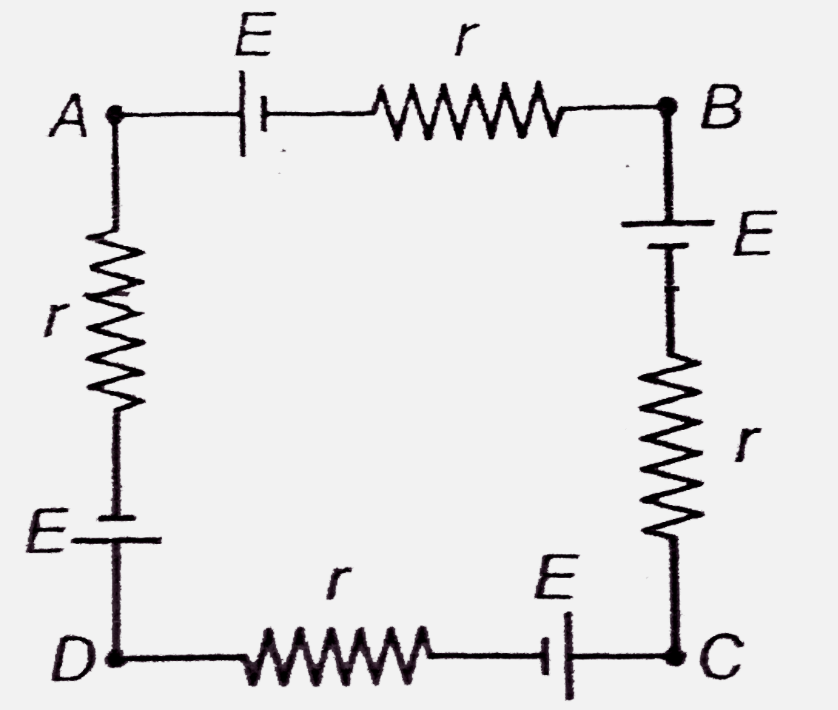A group of six identical cells each of emf E and internal resistance r are joined in series to from a loop. The terminal voltage across each cell is
E
6E
(E6)
Zero
To find the terminal voltage across each cell in a series circuit of six identical cells, we can follow these steps:
1. Identify the Parameters:
- Each cell has an electromotive force (emf) of E and an internal resistance of r.
- There are a total of 6 cells connected in series.
2. Calculate the Total EMF:
- The total emf (Etotal) of the series connection is the sum of the emf of each cell:
Etotal=6E
3. Calculate the Total Internal Resistance:
- The total internal resistance (rtotal) for the series connection is the sum of the internal resistances of each cell:
rtotal=6r
4. Determine the Current in the Circuit:
- Using Ohm's law, the current (I) flowing through the circuit can be calculated as:
I=Etotalrtotal=6E6r=Er
5. Calculate the Voltage Drop Across Each Cell:
- The voltage drop (Vd) across the internal resistance of each cell can be calculated using the formula:
Vd=I⋅r=(Er)⋅r=E
6. Determine the Terminal Voltage Across Each Cell:
- The terminal voltage (Vt) across each cell is given by the formula:
Vt=E−Vd=E−E=0
Final Answer:
The terminal voltage across each cell is 0.
- Each cell has an electromotive force (emf) of E and an internal resistance of r.
- There are a total of 6 cells connected in series.
- The total emf (Etotal) of the series connection is the sum of the emf of each cell:
Etotal=6E
- The total internal resistance (rtotal) for the series connection is the sum of the internal resistances of each cell:
rtotal=6r
- Using Ohm's law, the current (I) flowing through the circuit can be calculated as:
I=Etotalrtotal=6E6r=Er
- The voltage drop (Vd) across the internal resistance of each cell can be calculated using the formula:
Vd=I⋅r=(Er)⋅r=E
- The terminal voltage (Vt) across each cell is given by the formula:
Vt=E−Vd=E−E=0
The terminal voltage across each cell is 0.
Topper's Solved these Questions
Similar Questions
A group of six identical cells each of emf E and internal resistance r are joined in series to form a loop. The terminal voltage across each cells is
View SolutionFour cells each of emf E and internal resistance r are connected in series to form a loop ABCD. Find potential difference across (1) AB, (2) AC

View Solution
Knowledge Check
n identical cells each of emfe and internal resistance r are joined in series so as to form a closed circuit. The P.D. across any one cell is
AzeroBεCε/nDn−1nεn identical cells, each of emf E and internal resistance r, are joined in series to form a closed circuit. Find the potential difference across any one cell.
AE/nBE/nrCnE/rD0Tend identical cells each of potential E and internal resistance r are connected in series to form a closed circuit. An ideal voltmeter connected across three cells, will read
A10EB3EC13ED7E
(a) The emf of a cell is E and its intenal resistance is r. Its terminals are connected to a resistance R. The potential difference between the terminal is 12V if R=3Ω and 16V if R=8Ω. Find the values of E and r
(b) When an unknown resistance is connected across a series combination of two identical cells, each of 18V, current through the resistance is 4A. When it is connected across a parallel combination of the same cells, the current through it is 3A. Find the unknown resistance and internal resistance of each cell.
( c) p identical cells, each of emf E and internal resistance r, are joined in series to form a closed circuit. One cell (X) is joined with reversed polarity. Find the potential difference across each cell except X and also across X.
(d) 12 cells each having the same emf are connected in series and are kept in a closed box. Some of the cells are wrongly connected. This battery is connected in series with an ideal ammeter and two cells of same emf as of 12 cells. The current is 3A when the cells and the battery aid each other and 2A when the cells and battery oppose each other. How many cells in the battery are wrongly connected ?
View Solutionn identical cells, each of emf ε and internal resistance r, are joined in series to from a closed circuit. One cell A is joined with reversed polarity. The potential difference across each cell, except A, is
View Solutionn identical cells, each of emf ε and internal resistance r, are joined in series to from a closed circuit. One cell a is joined with reversed polarity. The potential difference across each cell, except A, is
View SolutionIf n identicals cells, each of emf E and internal resistance r, are connected in series. If two ends of this combination of cells are joined to each other without any external resistance. What will be the terminal potential difference across each cell?
View Solutionn identical cells, each of emf ε and internal resistance r, are joined in series to form a closed circuit. One cell A is joined with reversed polarity. The potential difference across any one cell is
View Solution
